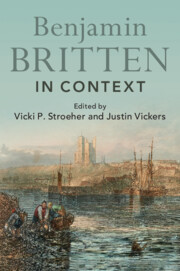Book contents
- Benjamin Britten in Context
- Composers in Context
- Benjamin Britten in Context
- Copyright page
- Dedication
- Contents
- Figures
- Tables
- Notes on Contributors
- Acknowledgements
- Bibliographic and In-Text Abbreviations
- Prologue
- Part I The Britten Circle(s)
- Part II British Musical Life
- Part III Britten and Other Composers
- Part IV Wordsmiths, Designers, and Performers
- Part V British Sociocultural, Religious, and Political Life
- Chapter 34 English and British National Identity in the Arts
- Chapter 35 The Place Within
- Chapter 36 Monarchy, Royalty, and Arts Patronage
- Chapter 37 Literary Leanings
- Chapter 38 Faith, Spirituality, and the Church
- Chapter 39 The Politics of the Closet
- Chapter 40 Communism, Socialism, and Pacifism in British Politics
- Epilogue Britten’s Legacy
- Further Reading
- Index
Chapter 40 - Communism, Socialism, and Pacifism in British Politics
From the 1930s to the Second World War
from Part V - British Sociocultural, Religious, and Political Life
Published online by Cambridge University Press: 31 March 2022
- Benjamin Britten in Context
- Composers in Context
- Benjamin Britten in Context
- Copyright page
- Dedication
- Contents
- Figures
- Tables
- Notes on Contributors
- Acknowledgements
- Bibliographic and In-Text Abbreviations
- Prologue
- Part I The Britten Circle(s)
- Part II British Musical Life
- Part III Britten and Other Composers
- Part IV Wordsmiths, Designers, and Performers
- Part V British Sociocultural, Religious, and Political Life
- Chapter 34 English and British National Identity in the Arts
- Chapter 35 The Place Within
- Chapter 36 Monarchy, Royalty, and Arts Patronage
- Chapter 37 Literary Leanings
- Chapter 38 Faith, Spirituality, and the Church
- Chapter 39 The Politics of the Closet
- Chapter 40 Communism, Socialism, and Pacifism in British Politics
- Epilogue Britten’s Legacy
- Further Reading
- Index
Summary
Few themes have greater longevity in Britten studies than politics. Conventionally, Britten abandoned his overt political engagement of the 1930s – symbolised by his departure to the United States – finding, through a process of self-discovery, a breadth of human expression that transcended the slogans of politicised art in Peter Grimes. Britten’s pacifism and left-wing politics have formed – with his sexuality – a nexus of othered identity that was, as Pears had it, ‘outside the pale’ in British society of the mid-twentieth century. However, this dichotomy of self and other risks rendering British society an undifferentiated landscape of political and social conservatism. This, in turn, prevents consideration of how Britten’s left-wing pacifism intersected with broader trends and attitudes, and other radical individuals, as well as of the place of politics within his myriad, complex interactions with such conventional institutions as the BBC or the monarchy. It is thus timely to reconsider how communism, socialism, and pacifism intersected with Britten’s musical career, exploring the history of these terms, and how they influenced aesthetics, cultural practice, and individuals.
Keywords
- Type
- Chapter
- Information
- Benjamin Britten in Context , pp. 351 - 358Publisher: Cambridge University PressPrint publication year: 2022

